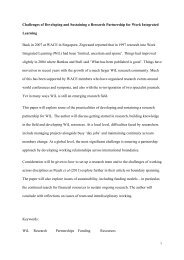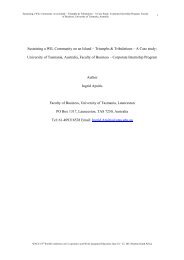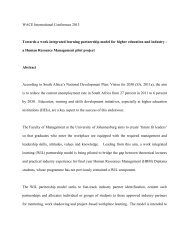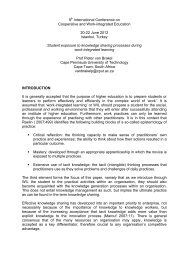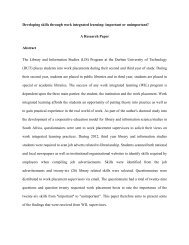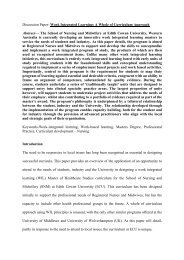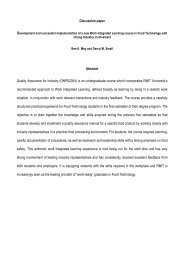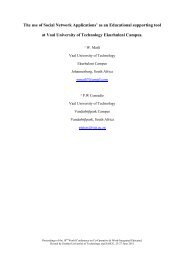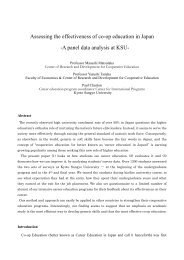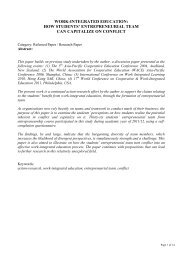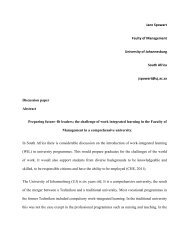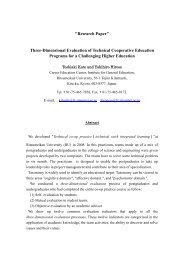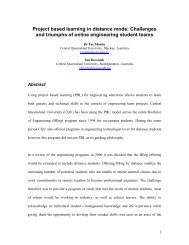Nor Idayu Mahat, Abdul Razak Saleh, Hartini Ahmad ... - WACE
Nor Idayu Mahat, Abdul Razak Saleh, Hartini Ahmad ... - WACE
Nor Idayu Mahat, Abdul Razak Saleh, Hartini Ahmad ... - WACE
Create successful ePaper yourself
Turn your PDF publications into a flip-book with our unique Google optimized e-Paper software.
Cooperative Education: Mixed of Skill Enhancements and Social Responsibilities<strong>Nor</strong> <strong>Idayu</strong> <strong>Mahat</strong>Centre for University-Industry Collaboration, Universiti Utara Malaysia, 06010 UUM Sintok,Kedah, Malaysia.Tel: +604 928 4098; Email: noridayu@uum.edu.my<strong>Abdul</strong> <strong>Razak</strong> <strong>Saleh</strong>Office of Deputy Vice Chancellor (Research and Innovation), Universiti Utara Malaysia, 06010UUM Sintok, Kedah, Malaysia.Tel: +604 928 3230; Email: razak289@uum.edu.my<strong>Hartini</strong> <strong>Ahmad</strong>Centre for University-Industry Collaboration, Universiti Utara Malaysia, 06010 UUM Sintok,Kedah, Malaysia.Tel: +604 928 5190; Email: hartini@uum.edu.myAbstractThis paper shares the idea of creating a cooperative education programme that mixes skillenhancements and social responsibilities through university-industry collaborations. The ideafocuses on the roles and responsibilities played by the university and industry in enhancingstudents’ hands-on skills and bridging them with the nearest communities in social activities.Some existing similar programmes related to skill enhancements and community servicesactivities are compared and a new programme that mixed of both is proposed.Keyword: Cooperative education, corporate social responsibility, university students, universityindustrycollaboration.1. IntroductionCorporate social responsibility (CSR) is one of the committed programmes by business entitiesin the business world. CSR, at the basis, is a programme that encourages business entities toexecute their operations ethically and to minimise waste on communities and environment.Subsequently, business entities can gain economic benefit continuously as the price of theirengagement on the CSR programme. The CSR has been defined by The World Business Councilfor Sustainable Development in 2001 as a business commitment that contributes to sustainableeconomic development through team work with employees and their representatives such asfamilies, local and public communities, to improve the quality of life by means of beneficialways for businesses and development (Jamali, 2006).A case study by Nur Diana Hidayati (2011) on four public companies in Indonesia revealed thatthe investigated business entities commit to the CSR for the beneficial of the business. Amongthe reasons of their commitment on the CSR include: to increase the reputation as goodcompanies for citizen, to sustain their business and to create mutual benefit relationship between1
the company and the community. Similar study by Hoivik (2011) provided some insights aboutthe significance of CSR to small and medium enterprises (SMEs) in <strong>Nor</strong>way. The CSR has beenregarded as an important knowledge to the SMEs in order to strengthen the expectations of theirmain stakeholders and to foster a financially and socially responsible business. Therefore, seriousactions were discussed and implemented to embed the understanding of CSR into businessstrategy, business innovation, personal development and continuous learning of the SMEs.The continuous efforts to overcome the scepticism of CSR in business world should be reflectedin university courses. Leigh (2004) listed some of CSR modules at universities in the UnitedKingdom which include Business Ethics and Social Responsibility module (NottinghamUniversity), Social Accounting module (Huddersfield University), Ethical and EnvironmentalReporting module (Glasgow University) and MBA in Corporate Social Responsibility(Nottingham University). Also, Leigh (2004) gave the details on the effort of Accounting andFinance Department of De Montfort University to incorporate interdisciplinary concepts ofaccounting and accountability as sustainable development and corporate social responsibility as amodule of a final year student. The module aims to assimilate the knowledge of CSR in businessand critically examine the role of accountant in real business activities. Universiti Utara Malaysia(UUM) offers various types of CSR programmes as either credited or non-credited module. Mostof these programmes, as understood by the authors, gave great focus on humanitarianvolunteerism and community development including donation for the poor and supportprogrammes for people at the rural areas.Centre of University-Industry Collaboration (CUIC) at the Universiti Utara Malaysia (UUM) isthe centralised centre for the management of collaborations between the university andindustries. Also, the centre is responsible to make an arrangement for the students toorganisations (both government sectors and private sectors) via cooperative education, which istermed practicum in the university. The centre manages almost 4,500 final year students annuallyfor the cooperative education of three colleges namely (i) Arts and Sciences, (ii) Business and(iii) Law, Government and International Studies. The module of cooperative education in UUMis offered at the end of the study and it takes about 4 to 6 months training at the identifiedorganisations, except for Law that takes four weeks training. The cooperative education iscompulsory for most undergraduate studies which contribute to 8 to 12 credits hours.This paper introduces a special cooperative education programme runs by a smart partnershipbetween CUIC and some public listed companies in Malaysia. The execution of the cooperativeeducation, takes as its core the notion of CSR and business, aims to sustain the development andto create more competitive advantage for the companies. As for CUIC, this programmestimulates research and consultation which further beneficial for the centre to become centre ofexcellence for industries (ICoE).2. Areas of Corporate Social Responsibility in MalaysiaAll public listed companies in Malaysia are encouraged to disclose their corporate socialresponsibility (CSR) activities to public. On December 2006, Bursa Malaysia launched a CSRFramework as a guide for public listed companies in implementing and reporting on CSR.2
external focuses and it impacts towards sustainable development oforganisational culture, finance, social influence and environment.Step 2: Design of specific CSR moduleCUIC selects some experts among lecturers in UUM to design a specificmodule for the identified CSR programme. A process of designing themodule is based on the Kolb (1984) learning cycle that allows forstudents to experience, to reflect themselves, to apply concepts andtheories and to plan to change the usefulness of CSR in business world.The module also utilises the work-based learning environment to engagestudents in critical thinking exercises. Next, the module is presented toPLC to identify cost, duration time of implementation and facilities.Step 3: Selection of students and mentorCUIC selects a number of students via face-to-face interview. Eachstudent is attached to a mentor, chosen among lecturers from herundergraduate study. Meanwhile, the PLC nominates a staff to superviseat least a student when the student is undergoing the work-based trainingat the PLC.Step 4: Work-based training at the PLCStudents undergo the work-based training at the PLC for at least 4months. During this period, they involve in managerial tasks in executingthe CSR programme to the target group depending on the focal area ofthe CSR. Students need to conduct SWOT analysis or/and need analysisof the programme as an exposure to them to grasp the understanding ofknowledge of CSR. Students receive advice from mentor and mayconduct discussion with staff of PLC. Meanwhile, CUIC will organisesome trainings for the employees at the PLC if the PLC does not haveexperts to execute the intention CSR programme.Step 5: Continuous monitoringBoth assignable lecturer and PLC’s staff are responsible to monitor thestudent throughout the attachment at the PLC. At the end, they mustevaluate the performance of the student. Meanwhile, the performance ofthe CSR programme is monitored and evaluated by the PLC.In general, CUIC-PLCs collaborate closely throughout the programme for conducting theCSR programme and educating the participated students. The needs and collaborationsbetween CUIC, public listed companies and companies are demonstrated in Fig. 1.4
Fig. 1: The collaborations in CSR cooperative education.The module of the CSR cooperative programme contains two major parts: (i) commonknowledge and training and (ii) specific knowledge and training. The common knowledge andtraining instil common management and business skills to students where they, in general, havetoIdentify issues related PLC’s capacity to commit in CSR.Describe the CSR activities that the PLC planned to cover.Analyse the CSR activities in a sense of how the activities may give some implications(tangible and intangible) to the organisation and community.The specific knowledge and skills differs depending on the needs of the CSR programme. Forexample, CSR programme that attempts to give basic entrepreneurial skills to the origin (orangasli) should consider the use of pictures, tools and more hands-on activities to deliver theknowledge rather than workshops and talks. Therefore, students should be equipped with someknowledge to understand the behaviour and background of the target community beforeexecuting the CSR activities.4. The EvaluationThe evaluation of the CSR programme is mainly performed by the PLC as they need to look intosome aspects relate to business performance, reputation, added value to employees and manyinternal and external focuses. This issue is not going to be delivered in details in this paper.However, the focus of the evaluation is centralised to the successful of the programme to instilrecent management skills to students and to identify some added values from the students. Theevaluation process endeavours to balance between conceptual outcomes and outcome measure asthe CSR cooperative education has to meet the needs of the academic programme and theexpectation of the PLC. Therefore, the evaluations on students’ performance are made based on5
(i) judgment of their improvement in soft skills (e.g. communication, teamwork, leadership, timemanagement etc.) which is measured via five-point Likert scale and (ii) technical skills (e.g.competency in critical thinking, preparing SWOT analysis etc.) which are based on report, paperwork and other tangible evidences.5. SummaryThe programme provides a platform for tripartite engagement and allows knowledge sharing(theories and practices) between university, PLC and students. Students get benefit to enhancetheir managerial knowledge and skills especially in CSR hence leads to increase theiremployability. The work-based experience exposes students with real business activities andmentoring system gives students platform to discuss, to identify and to bridge the theories andpractices. Meanwhile, the PLC directly involve in CSR for developing future talent amonggraduates by providing working experience at their place. They also get benefits via knowledgeand technology sharing from the university. CUIC has started this programme with one PLC inearly 2012, and in future, more PLCs are going to be invited to engage in this cooperativeprogramme. CUIC will conduct some analyses in future to measure the effectiveness of thisprogramme and may take some necessary actions to improve the programme.6. ReferencesBursa Malaysia (http://www.bursamalaysia.com)Hoivik, H.W. (2011). Embedding CSR as a learning and knowledge creating process: The case for SMEsin <strong>Nor</strong>way. Journal of Management Development, 30(10), 1067-1084.Jamali, D. (2006). Insight into triple bottom line integration from a learning organisation perspective.Business Process Management Journal, 12(6), 809-821.Leigh, H. (2004). Experiences from a student programme designed to examine the role of the accountantin corporate social responsibility. International Journal of Sustainability in Higher Education, 5(4), 404-416.Lewis, S. (2003). Reputation and corporate social responsibility. Journal of CommunicationManagement, 7(4), 356-364.Nur Diana Hidayati. (2011). Pattern of corporate social responsibility programs: A case study. SocialResponsibility Journal, 7(1), 104-117.6



